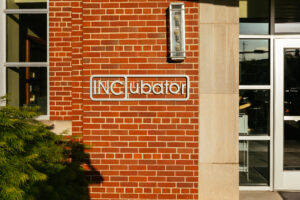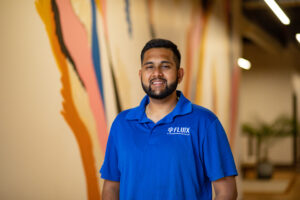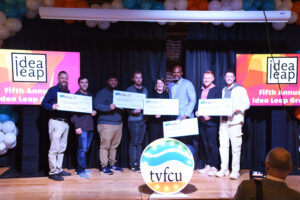Holly Bonner
Businesses around the country have released virtual tourism experiences for Americans who are social distancing and settling into a new normal.
Some are finding ways for these experiences to grow or maintain audiences. Others use them to provide resources to the community in a time of need.
From Facebook live events to virtual webcams, local attractions like SoundCorps, the Charles H. Coolidge National Medal of Honor Heritage Center, the Chattanooga Public Library, the Tennessee Aquarium and the Chattanooga Zoo, use technology to our advantage during the pandemic.
Rather than a temporary solution to a short-term problem – virtual experiences may be here to stay as many audiences remain digital post-pandemic.
SoundCorps
From Zoom book clubs to virtual business meetings, you’ve probably done it all at this point.
But, have you let someone serenade you over the phone yet? Stratton Tingle, Executive Director of SoundCorps and Founder of Sidewalk Stages, has almost every week since the pandemic.
“We had to cancel auditions for Sidewalk Stages this year because we couldn't gather in public spaces,” Tingle says. “So, we had a number of performers call or FaceTime me to audition.”
Sidewalk Stages, a local street performance initiative designed by SoundCorps, activates Chattanooga public spaces with live local music. Due to social distancing, Sidewalk Stages moved its performances to Facebook, where artists play to online audiences for tips.
“Sidewalk Stages helps performers realize new forms of income, build their skills and learn new music,” Tingle says.
In an average year, SoundCorps manages around 700 performances which attract approximately 210,000 people. Going virtual provides a source of income to many artists struggling due to the pandemic.
SoundCorps also partnered with The Enterprise Center’s Tech Goes Home program to provide WiFi hotspots to musicians and music teachers impacted by this spring’s tornado.
“I think that video performances and engaging online audiences are key to the future of music in general, especially right now, in light of COVID-19,” Tingle says.
Going forward, Tingle plans to create new ways to use virtual experiences to support local musicians and draw more people into the Chattanooga music scene.
“Our vision is to reestablish Chattanooga as one of America's great music cities.”
The Charles H. Coolidge National Medal of Honor Heritage Center

Twenty-three days after its grand opening, the Charles H. Coolidge National Medal of Honor Heritage Center temporarily closed its doors amidst COVID-19.
Always looking ahead for new audiences, the National Medal of Honor Heritage Center continued to make history by launching Chattanooga’s first Living History Virtual Class.
“I’ve been really impressed with how engaged students have been with their virtual classmates and the quality of the questions they're asking,” says Hannah Sher, the Heritage Center’s Director of Education. “Students are recognizing how people are working together now the way they did during WWII.”
On the Heritage Center website, students and teachers can sign up to interview a living historian or veteran and hear a short lecture on a relevant American war. The class helps students learn more about the coronavirus by pointing out parallels between the past and present.
“The more ways we can reach people, the better,” Sher says. “Although we weren't originally going to focus on online educational resources, we adapted because we wanted to bring new programs to as many people as possible and keep our content relevant.”
The museum celebrates Chattanooga’s legacy as the first place to award the Medal of Honor, by reminding us of the six traits the medal embodies – patriotism, citizenship, courage, integrity, sacrifice and commitment.
“Right now, we should ask ourselves, ‘What does it look like to show commitment to each other and be courageous even when you're staying at home?’”
The Chattanooga Public Library
By now, you have probably heard of Leslie Jordan – the Chattanooga native and famous actor keeping people laughing during quarantine.
While social distancing at home, Jordan made celebrity appearances on a Chattanooga Public Library Facebook live events. One video featuring Jordan’s reading of Jimmy Kimmel’s “Serious Goose” received over 2,700 likes and 550 comments.
Partnering with Jordan and other locals, the Library offers bedtime stories, DIY videos, STEAM experiments, studio tutorials and more.
On their website, they also provide free access to Ancestry.com, so people can pass the time by learning about their genealogy.
“We want to keep providing free educational resources, especially when so many people are working from home and homeschooling their kids,” says Christina Sacco, the Library's Public Relations Coordinator.
Library staff have enhanced their ability to provide more people with learning tools and technology, with a focus on at-home resources they typically wouldn’t be able to access.
“I think it's way too popular not to continue, especially when we see comments where someone is watching from somewhere like New York,” Sacco says. “We don’t want to lose the ability to reach a wider audience.”
Tennessee Aquarium
If you need to relieve some stress, take a virtual trip to the Tennessee Aquarium to watch penguins during nesting season. Scientific research shows that aquarium experiences help reduce blood pressure and lower heart rates.
Since the coronavirus, the Aquarium has continued to engage its audiences through webcams and Facebook live events.
“There have been people from literally all over the world chiming in and asking questions. We’ve had people from places like the Marshall Islands and Ukraine telling us they are watching,” says Thom Benson, the Aquarium’s Director of External Affairs.
He hopes the Aquarium will continue using Facebook live events for families in the future, though maybe not be at the same frequency.
“All of these opportunities are giving us new ways to think about reaching our supporters. On Facebook, we have seen a huge growth in our live audience,” Benson says.
Along with live videos, the Aquarium’s award-winning educational department created Weekday Wonders, an online curriculum of free, science-at-home activities. The purpose of the program is to give parents an opportunity to teach kids more about the natural world.
The daily activities guide families through a variety of engaging discussions and physical challenges, including nature journaling, art or craft projects, scientific investigations and animal-themed yoga.
“I think our education department will continue looking for more opportunities to engage with people through this digital outreach,” Benson says.
The Chattanooga Zoo
Looking for a change of scenery? The Chattanooga Zoo streams free live videos of its animals. On Facebook, online viewers can also watch zookeepers’ educational snippets about the zoo’s featured animals.
Darde Long, President & CEO of the Zoo, says her staff has bolstered their social media presence during the coronavirus.
“It dawned on me that there are a lot of people who don't get to come to the zoo, and this is a really good way to communicate with them. Now, we better understand that there is a whole other audience out there we can connect with,” Long says.
Even after stay at home orders are lifted, Long believes virtual experiences are necessary to cater to people who cannot go to the zoo due to disabilities, financial concerns or other reasons.
“We've learned that while we prefer our guests up close and personal, there are other unique ways we can reach them,” Long says. “It's all about how you allocate resources, and this seems to be a good use of our time.”
For more live webcams, virtual tours and other local digital experiences, visit the Chattanooga Tourism Co. here.








